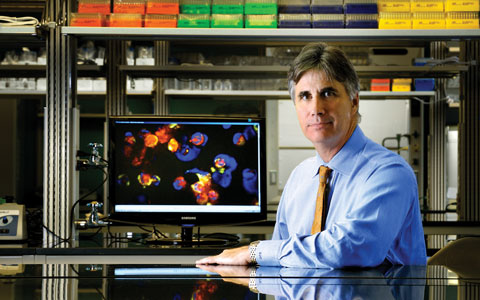From USC to UM to Build a World-Class Department
Richard Cote to head pathology and nanoscience research
Among the many colorful photographs of family members in Richard J. Cote, M.D.’s, new office on the medical campus is a black-and-white portrait of a friend and mentor, Edward “Ted” James Beattie, M.D., who invited Cote to visit the medical school in the early 1980s. A notable surgeon and lung cancer specialist who was instrumental in setting up Sylvester Comprehensive Cancer Center, Beattie was at UM only for a short time—but Cote never forgot Beattie telling him that UM’s medical school was on track to become a great institution.
 |
| Richard J. Cote, M.D., the new chair of the Department of Pathology, will start and direct the University of Miami Biomedical Nanoscience Institute. |
It is somewhat
ironic that after nearly two decades
at the University
of Southern California Keck School of Medicine and a career that has made him
a well-regarded authority in the
areas of pathology, nanotechnology,
and translational research, Cote
recently made the move to Miami
to take the reins as chair of the Department of Pathology at the
Miller School and the University
of Miami Health System, and chief
of pathology for Jackson Memorial Hospital. He will also start and direct the University of Miami Biomedical Nanoscience Institute.
“Ted always had a clear understanding of challenges and opportunities in medicine. After these many years,
I recognize where this campus is going and clearly see the potential for where
it could go,” says Cote, who recently settled in Coconut Grove with his
wife, Anne, and children: 15-year-old twins, Nicholas and Juliet, and
11-year-old Gracie.
“A real attraction for me is the exciting leadership of President Donna Shalala and Dean Pascal Goldschmidt.
I have the good fortune to be working with Eneida Roldan, the new president and CEO of Jackson Health System.
It’s a new medical school and hospital leadership team and one of the most visionary and inspiring I have encountered. Another huge attraction is the high quality of the pathology faculty, who will be the basis for the growth
and success of the department. This
is the most exciting academic medical environment in the country today.”
“Richard Cote is an expert pathologist with tremendous leadership and organizational skills, internationally recognized for his work in the investigation and clinical assessment of disorders based on biopsy, tissue analysis, and other fluid patterns,” says Dean Pascal J. Goldschmidt, M.D. “He is a visionary leader, a pioneer researcher, and the best candidate to make the Miller School’s pathology department one of the best
in the world.”
Indeed, Cote is recognized as an outstanding pathologist (he is consistently named in the “Best Doctors in America” and “America’s Top Doctors” lists) and world-class scientist. The process by which normal tissues become cancerous has been a major focus of
his research, where he has concentrated on bladder and prostate cancer. He is investigating the molecular changes that accompany the progression (why cancer kills some patients and not others) and why some patients respond to therapy.
Cote is also interested in the detection and characterization of the earliest spread of cancer. Along with research associate professor Ram Datar, Ph.D. (formerly of Oak Ridge National Laboratory), who followed Cote to
the Miller School, and colleagues at California Institute of Technology, Cote has already developed a novel, highly efficient platform for capturing and characterizing circulating tumor cells
in the blood of cancer patients.
“This has been very exciting. Our platform for cell capture appears to be more efficient and effective than any other methodology that currently exists,” remarks Cote. “It’s already in clinical trials, which is a key event in translational research.”
Cote’s interest and research also led him to become an expert in nanotechnology, the fast-growing field in which scientists work with materials and devices on an atomic or molecular scale.
The tremendous nanotechnology expertise that Cote brings to the Miller School was honed at USC, where he launched the highly successful biomedical nanosciences program. Out of
this came a series of funded research programs and collaborations with Caltech, University of California, Berkeley, UCLA, and Oak Ridge National Laboratory.
“Technology development has
really been in support of the more fundamental questions in my research, and that’s what got me into nanotechnology,” notes Cote, who is part of a group of researchers that holds several nanotechnology patents.
At Miller, Cote has big plans
for his department and is already expanding its functions from Jackson Memorial and Sylvester Comprehensive Cancer Center to include University
of Miami Hospital.
In particular, Cote has begun implementing a subspecialty system in anatomic pathology. The pathologists who examine and diagnose tissue removed from the operating room will be experts in corresponding areas. For example, breast tissue will be handled by pathologists with expertise in breast disease. This will be a major benefit to the clinicians and also to the residency training program in pathology, where the residents will now have the benefit of learning from experts in their respective fields.
Cote says research will also be boosted at all levels. New basic scientists will be hired to focus on translational research, and a Division of Translational Pathology is planned.
“Translational research has to be done not only on mice or on cell lines, but on actual human tissue. In order
to do work on human tissue, you have to know what is in it. The people who know what to look for in tissues are pathologists—they are uniquely qualified and sometimes are the only ones who can actually direct the appropriate kinds of experiments,” offers Cote.
Cote’s next wave of experiments
will occur at the Miller School. It’s where he will improve and expand the clinical practice, conduct advanced research, and translate new discoveries to patient care. “Already, this job has been overwhelmingly rewarding,” says Cote. “It’s a chance to make a real difference in medicine and to mentor a new generation of physicians and scientists.”
|


